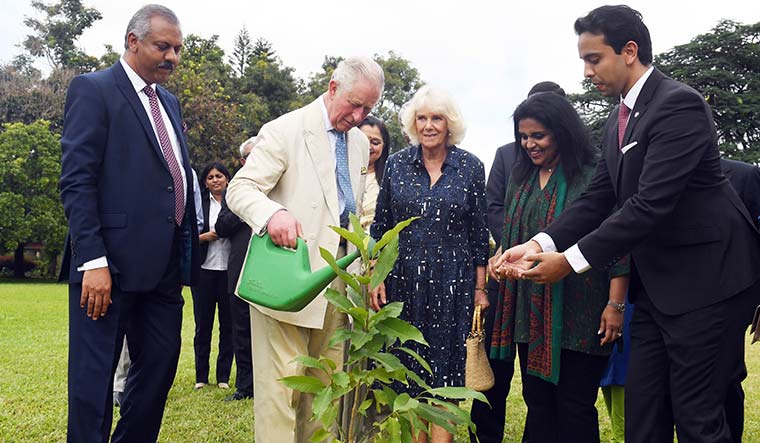ON THE OUTSKIRTS of Bengaluru, Queen Consort Camilla and King Charles III found a haven. SOUKYA, a holistic health centre, has been their favourite getaway from the palace’s heavy security and public scrutiny in the UK. So much so that Camilla has made quiet visits to the wellness centre, not once but eight times, in the last decade. Her last visit was in October 2022. Charles had accompanied her in November 2019.
The royal couple’s frequent visits reiterate their patronage of and belief in integrative, holistic medicine, says Dr Issac Mathai, who cofounded SOUKYA with his wife Suja in 2011. Mathai has been a holistic physician to Charles for more than a decade and is one of the very few to be invited for the coronation.
“Ms Camilla is a humble person,” says Mathai, adding that she prefers to carry her bags and be treated like any other patient. “When I met her in London after the Queen’s funeral, she told me she wanted to visit SOUKYA as it had been planned much earlier. She told me the visit was very important for her. The palace officials told me that the royal couple get privacy at SOUKYA, which they cannot get in the palace with a fleet of security and staff. Camilla is down to earth and genuinely feels for people. Over the last 10 years, she has grown closer to the people of [Britain]; [that] is what I [have] learnt from friends in London. Her family members are ordinary people.”
During her visits to SOUKYA, Camilla is often accompanied by her sister, other family members or friends. The security is usually light, except during her last visit for eight days as queen consort. She has celebrated Diwali thrice at the centre. “The royal couple were witness to a special firecracker session―not the noisy crackers―hosted for them at the centre,” says Mathai. “The royal couple had planned a visit in January but it was called off at the last minute owing to apprehension over a fresh Covid outbreak.”
A stay at the centre begins with a morning yoga session at 7:15. The couple, both in their 70s, do the asanas with relative ease. “The couple chose the common treatment area instead of a private space attached to their suite,” says Mathai. “They did yoga with all others during the sessions.” After breakfast, it is time for rejuvenation treatments, followed by lunch. After an hour of rest, the second round of therapies begin, followed by a meditation session before dinner and lights out by nine.
The royals love the food served at the centre, even packing some for their flight back home. Breakfast is usually south Indian food―dosa, appam with stew, and with an option of omelette and eggs benedict. “During his visit, King Charles told me that the eggs benedict served here was the best he had had in recent times,” says Mathai, adding that Camilla is a light eater. “They love fruits [which come from the organic farm] and fruit juices, especially water melon and pomegranate. They also relish chapati, lentils and beans. We serve continental food as a second option for dinner. But they prefer Indian food.”
The couple loves taking long walks through the sprawling campus, visiting the organic farm or the cattle shed. A walk through the garden is one of Charles’s favourite pastimes. “It is pretty much a wild garden and not a manicured one and the king likes it as it reminds him of an English garden,” says Mathai. “The king has strong views on climate change and global warming. Camilla’s brother, who passed away, was a big supporter of elephant protection and she, too, shares his passion. When they visited Kerala, they visited the elephant camp.”
Charles had also mooted the idea of forming a group from south India to take up environment and wildlife protection in collaboration with his British Asian Trust. “I had held discussions with some prominent people like Nandan Nilekani,” says Mathai. “But then Covid happened and it got shelved.”
Mathai was touched by Charles’s gesture when he offered assistance in managing the centre during the Covid-19 lockdown. He had initially thought that the inquiry had come from Charles’s office. “But when I visited him in London, he told me he was worried about how we were managing and was offering to help us. I told him I was happy that he had thought of me,” he says.
Mathai meets the king once every three to four months as a personal physician. “The king’s medical team has 45 specialists, mostly allopathy practitioners,” says Mathai, adding that the king was a patron of alternative medicine much before the duo met. “There is a royal homeopathic pharmacy. Since 1985, the king has been a patron of the British Holistic Medical Association. An interaction between Prime Minister Narendra Modi and King Charles resulted in the launching of an Ayush centre in London in 2018, where research on the effectiveness of Indian science systems in health care will be studied. SOUKYA has a facilitator’s role in the project.”
Charles is even keen on having an Ayush centre on his estate―Dumfries House in Scotland, a 2,500-acre organic farm with lodging facilities and a primary health centre (PHC), says Mathai. “The PHC is providing free treatment to the locals, which is funded by the king, and the plan is to include ayurveda, yoga and naturopathy as part of the treatment module along with western medicine and traditional homeopathy,” he says.
The bond that the royal couple has with SOUKYA seems to be only growing, just like the champak tree planted by Charles and Camilla in 2019.


